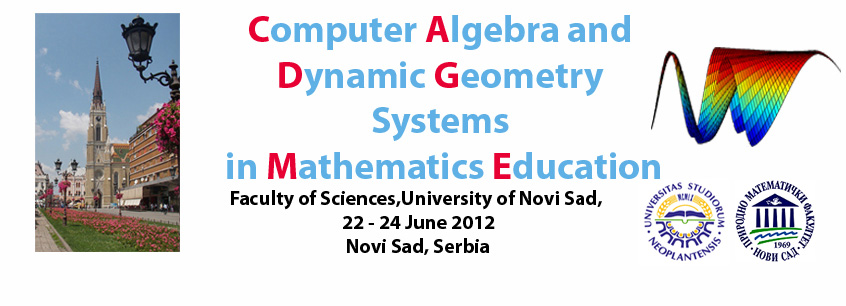How to contribute
Contributed talks
Working groups and Workshops Accepted by the Scientific Committee
Working Groups
Homero Flores, Colegio de Ciencias y Humanidades-UNAM, México
Interactive Modeling and Computable Documents in Education
János Karsai, University of Szeged, Hungary
Making Materials Based on TEX and CAS/DGS
Masataka Kaneko, Kisarazu National College of Technology,Japan
Setsuo Takato, Toho university, Japan
Theorem-Prover based Systems (TPS) for Education (eduTPS)
Filip Maric, University of Belgrade, Serbia,
Walther Neuper, Graz University of Technology, Austria
Future Trends in Interactive Geometry
Ulrich Kortenkamp, CERMAT / Martin-Luther-Universität Halle-Wittenberg, Germany
Workshops
How to prepare interactive Mathematica documents for classroom
János Karsai, University of Szeged, Hungary
Workshop about symbolic manipulations with random variables using Maple CAS
Mihály Klincsik, University of Pécs, Hungary
GeoGebra in studying functions
Péter Körtesi, University of Miskolc, Hungary
Casyopée an open environment for learning about functions at upper secondary level
Jean-baptiste Lagrange, University of Reims, France
Volume and area ratios with GeoGebra
Libuse Samkova, University of South Bohemia, Ceske Budejovice, Czech Republic
Interactive math and science education in the Benelux, using TI-Nspire and TINavigator in secondary education
Gert Treurniet (The Netherlands) and Jürgen Schepers (Belgium, Flanders),
Both teacher in secondary Education and consultant for Texas Instruments
The possibilities of and limits to the application of the GeoGebra dynamic geometry programme in elementary and secondary education
Lajos Szilassi, University of Szeged, Hungary
Beyond DGS - Simulations and Scripting with Cinderella
Ulrich Kortenkamp, CERMAT / Martin-Luther-Universität Halle-Wittenberg, Germany
